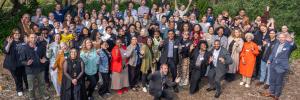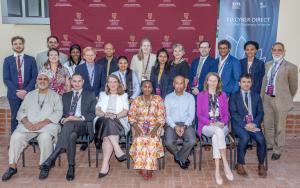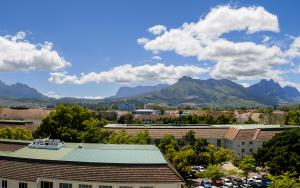
Participants at SU’s Language Day, hosted by the Language Centre at STIAS, where students and staff reflected on multilingualism as a cornerstone of belonging, access and transformation.
Language Day reflects on multilingual mindset as the centre of student success
- Language Day highlighted how multilingualism strengthens belonging, access and success across all areas of student life at SU.
- Students and staff shared experiences showing how language shapes identity, learning, and meaningful engagement in a multilingual community.
- Discussions affirmed that language is central to transformation — a bridge to dignity, opportunity and mutual understanding.
Multilingualism at Stellenbosch University (SU) has a rich and unique history, deeply rooted in the South African context. It is also central to the University’s ongoing efforts of restitution, transformation, equity and respect.
This year, Language Day, a biennial event devoted to measuring the temperature of multilingualism at SU, foregrounded how language shapes every step of the student journey – from registration to graduation. Hosted by the Language Centre at the Stellenbosch Institute for Advanced Study (STIAS) early in September, the day drew approximately 100 participants, including students and staff from all corners of the University. The day entailed two interactive panel discussions, small-group discussions and plenary feedback sessions that focused on language in academic, social and living spaces, as well as the world of work. Each conversation was approached through the lens of multilingualism and respect for linguistic diversity, and also touched on key aspects of intercultural competency – such as listening to understand, and respecting different multicultural contexts.
Discussions about language at SU are not always straightforward, but events such as Language Day showcase the many ways in which multilingualism and multiculturalism are actively celebrated and integrated into university life. The day’s activities showed how language and culture are fluid and respected – from interpreters seamlessly conveying jokes and nuance between speakers of isiXhosa, Afrikaans and English, to engaging discussions in participants’ language of choice instead of the language of expectation, and the celebration of the diversity of Afrikaans culture and the ways in which it has become part of the restitution project.
Opening the programme, SU Rector and Vice-Chancellor Prof Deresh Ramjugernath set the tone for a day focused on belonging and access through language. “Every two years, we pause for Language Day; not to debate policy or structures, but to have honest conversations about how language shapes our everyday experiences,” he said. Reminding participants that language at SU involved both identity and pedagogy, he added: “Language is never neutral: It shapes who feels included, whose knowledge is valued, and how we understand the world around us.”
Ramjugernath situated SU’s approach to language within national policy and the realities of a multilingual continent in a globalising world. English may be dominant in higher education and the workplace, he noted, but that makes the case for multilingualism stronger, not weaker. “For us in higher education, multilingualism is not optional,” he said, pointing to the graduates the University seeks to shape: learners with inquiring minds, dynamic professionals and engaged citizens able to communicate across difference.
The first panel focused on inclusion, engagement and belonging for student success. Facilitated by Dr Benita Bobo (Centre for Teaching and Learning), panellists Dr Heidi October (Centre for Student Life and Learning), Dr Simthembile Xeketwana (African Languages), In-Aam Kafaar (primaria of Silene, and student in General Linguistics) and Gerrit Stemmet (chair of Dagbreek’s Multilingualism Committee, and student in Data Science) shared their perspectives and lived experiences. Xeketwana presented research exploring the feelings of linguistic marginalisation experienced by students whose schooling included multiple languages in rural or township schools, but who faced academic and social barriers in shifting to English-only instruction at tertiary level.
The second panel discussed multilingual competency as a graduate attribute against the backdrop of global citizenship. Dr Katlego Letlonkane (Human Resources) facilitated the conversation, weaving her own intentional use of Setswana and her background in labour law into the discussions. Panellists Prof Karin Wolff (Engineering teaching and learning advisor), Prof Marcelyn Oostendorp (General Linguistics), Simangele Mashazi (General Linguistics) and Sarah Richmond (Unit for Global Learning, SU International) exchanged views. Prof Wolff highlighted that intercultural competence is key to professional success and industry recognition, especially considering the increasing focus on global employability. Richmond spoke about “internationalisation at home” and global citizenship as outcomes of multilingual practice on campus, while Oostendorp and Mashazi shared their reflections on a linguistic citizenship approach to teaching and learning.
Participants’ feedback emphasised practicality. “Take individual responsibility to learn another language,” one said. “Do it scared, even if you think you sound different or funny,” adding that lecturers should “model this in the classroom”. Others called for incentives for staff and students to build multilingual capacity, and for the strategic use of artificial intelligence tools to facilitate language learning and mutual understanding. Simple gestures matter too, as shown by one participant’s suggestion of “using key phrases/words in other languages while teaching to show that you are trying”.
Closing the day, acting Deputy Vice-Chancellor: Learning and Teaching Prof Richard Stevens tied together the elements of belonging, identity and access. “Your voices and stories have reminded us of the heart of today’s theme: that language is never just about words. It is about belonging, identity, and access,” he said. He urged colleagues to embrace translanguaging – the dynamic use of multiple languages in one space. “Far from fragmenting us, translanguaging connects us,” he said.
The overriding principle emerging from the day’s discussions was that language is a bridge. As Ramjugernath put it: “Excluding students from full participation because of language is to deny them dignity, opportunity and access. To transform, we must instead see language as a bridge.”



